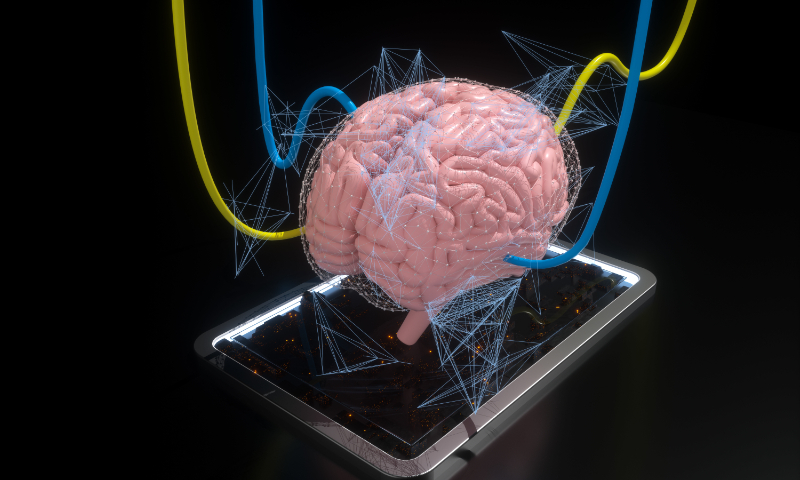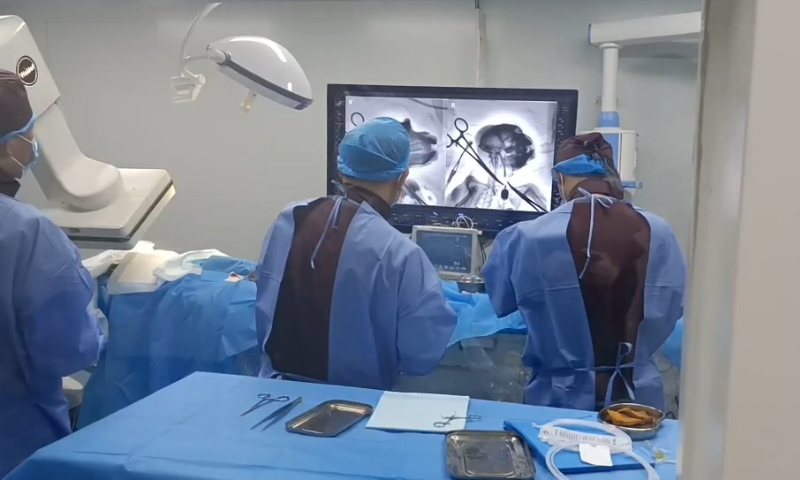
A concept photo of interventional brain-computer interface (BCI) experiment Photo: VCG
The world's first interventional brain-computer interface (BCI) experiment in non-human primates was successfully completed in Beijing on Thursday. It carries important significance in promoting brain science field research and signaled that China's BCI technology - a sector at the forefront of a white-hot technology war between China and the US - has jumped to internationally leading levels, industry insiders said.
An interventional electroencephalograph was attached to a monkey's cerebrovascular wall through minimally invasive surgery, after which technicians were able to identify and collect electroencephalograph (EEG) signals. Based upon these signals, active control over a mechanical arm was achieved.
Ma Yongjie, who is participating in the interventional BCI experiment project, was quoted as saying in a Beijing Daily report published on Friday that the experiment is based on a previous interventional BCI trial on sheep.
The successful completion of the experiment represents a "leap forward" in China's EEG signals technologies, from passively collecting to actively controlling, the report said. It also marks breakthroughs in a number of technologies, including the collection of EEG in blood vessels and identification of interventional EEG.
The experiment was led by Nankai University professor Duan Feng's team, and jointly completed by Chinese People's Liberation Army General Hospital and Shanghai HeartCare Medical Technology Co.

The interventional brain-computer interface (BCI) experiment in non-human primates Photo: Nankai University
Interventional BCI, along with invasive BCI and non-invasive BCI, are the three main technologies under research and development (R&D) involving this emerging bioscience sector.
A manager at a Chinese BCI device company, who spoke on condition of anonymity, told the Global Times on Friday that the US, represented by technology company Neuralink founded by Tesla CEO Elon Musk, has a clear edge in invasive BCI technology thanks to an early start. China excels in non-invasive technology, as it is a forerunner in decoding and brain-computer system applications.
"In the invasive BCI field, China's gaps with foreign rivals are quite large. Against this backdrop, the breakthrough in interventional BCI could be a great catch-up with foreign competitors," the manager said.
Invasive BCI technology generally involves craniotomy surgery to install electrodes around the cerebral cortex zone. While this results in the most accurate EEG among the three technologies, such an invasive mode would inevitably cause harm to the human body, and could lead to an inflammatory response and rejection, according to industry insiders.
Non-invasive technology collects EEG through the epicranium, and is a much safer way compared with the invasive mode, but the EEG collected is of inferior quality.
Interventional BCI is somewhere between the two, as it achieves brain-computer connection through minimally invasive surgery similar to a heart stent. It causes less harm to the human body than invasive tech, while its EEG quality is superior to that of non-invasive tech.
Ma said that it would take five years or even longer for the interventional BCI technology to be mature enough for clinical use, the Beijing Daily reported.
"Completing trials on animals is a ground-breaking progress, and a step from zero to one. But there's still a long way to go, as [developing technology] for clinical application is a prolonged process from one to 100," Ma noted.
In the next stage, Ma said the team will optimize the electrode design, verify the safety and reliability of devices installed in animals' bodies for the long term, as well as further analyze and process the EEG collected.
As for the wider application of BCI technology, Ma said that certain scenes from science fiction are achievable, such as the direct display of human being's minds and driving vehicles using consciousness, but that would take a quite long time.
In 2020, Chinese scientists successfully implanted two microelectrodes into the brain of a 72-year-old male patient whose body had been paralyzed from the neck down, which then linked his central nervous system to a mechanical arm. He was able to control the arm through natural signals from his brain after the surgery.
It was reportedly the first successful BCI operation on an elderly patient in China. Ma said it was also China's most advanced BCI clinical application to date.





